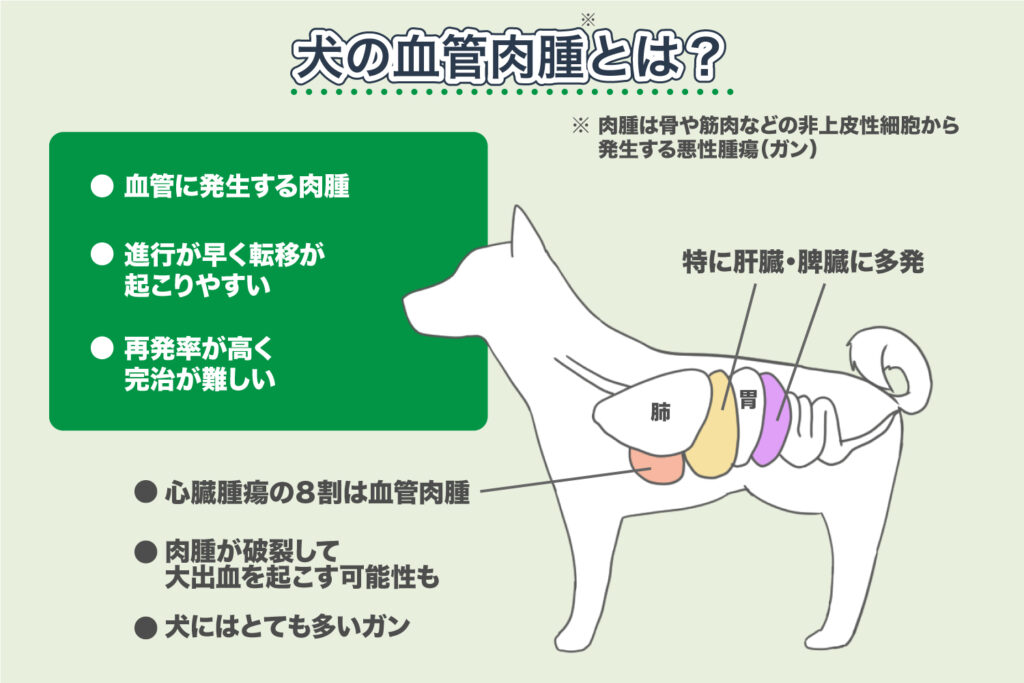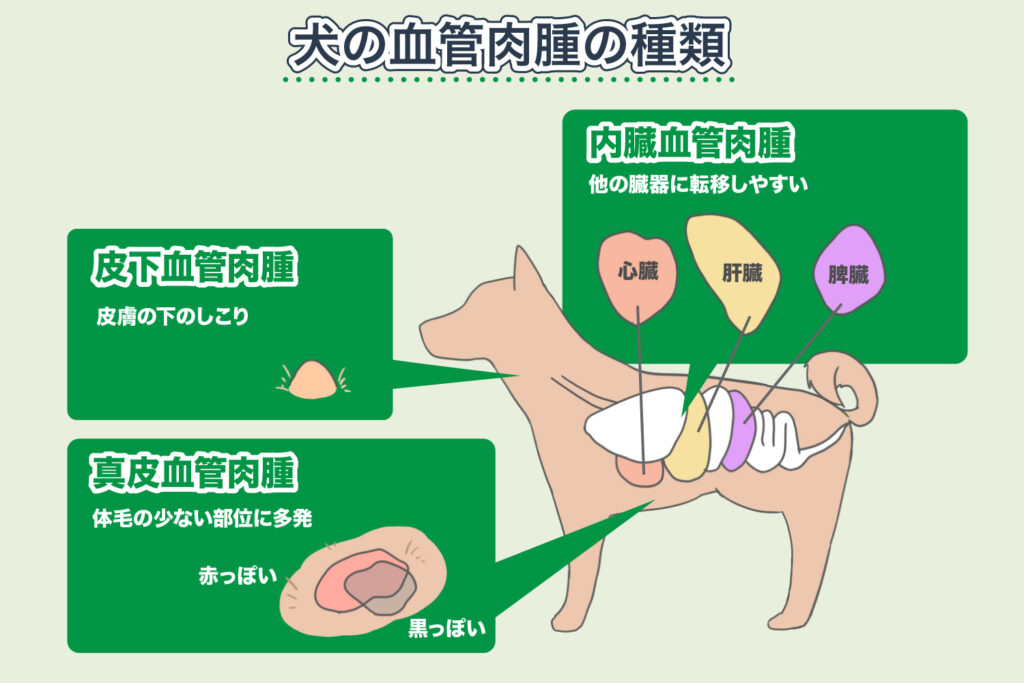Don’t be discouraged if your dog is diagnosed with hemangiosarcoma.
We believe that efforts to boost the immune system can improve the dog’s condition, maintain their quality of life (QOL), and help them regain vitality and appetite.
In fact, there are numerous cases where immunity measures with Cordy have successfully controlled cancer in dogs.
This page summarizes the types and symptoms of hemangiosarcoma, general treatments, and methods to maintain the QOL (Quality of Life) of dogs with hemangiosarcoma by boosting their immunity.
We also introduce many examples of improvements. We hope it will be a source of support and a beacon of hope for you all.
目次
- 1 What is Hemangiosarcoma in Dogs?
- 2 Types of Hemangiosarcoma in Dogs
- 3 Common Breeds for Hemangiosarcoma in Dogs
- 4 Common Treatments for Hemangiosarcoma in Dogs
- 5 Prognosis, Life Expectancy, and Survival Rates for Hemangiosarcoma in Dogs
- 6 Prevention of Hemangiosarcoma in Dogs
- 7 Aiming to Prolong Life and Overcome Hemangiosarcoma in Dogs
What is Hemangiosarcoma in Dogs?

Among sarcomas, those that originate in the endothelial cells of blood vessels are called hemangiosarcomas. They can develop anywhere there are blood vessels but are particularly common in the liver and spleen, where there are many blood vessels.
In dogs, they most commonly arise in the spleen, and are highly malignant with very rapid progression and a high likelihood of metastasis.
Hemangiosarcoma is cancer that affects the cells lining blood vessels, and it is a highly malignant cancer that easily metastasizes along the bloodstream.
About 80% of tumors that form in the heart are hemangiosarcomas.
The incidence of hemangiosarcoma in dogs is much higher compared to humans and cats.
Furthermore, it is a type of cancer with a high recurrence rate post-surgery, making it difficult to achieve complete cure.
When hemangiosarcomas develop in a dog’s spleen or liver, the sarcoma can rupture, leading to massive bleeding and potentially fatal outcomes once it grows large.
For Those Whose Dogs Have Been Diagnosed with Hemangiosarcoma
Due to the high malignancy of hemangiosarcoma in dogs, it is generally challenging not only to cure it but also to control it, and the prognosis is said to be extremely poor.
It is difficult to detect in its early stages due to few symptoms.
It is not uncommon to notice changes in condition due to tumor rupture and bleeding.
There are cases where the prognosis is given as one month to live upon discovery, making it a severe form of cancer.
However, with the right approach, it is not uncommon to coexist with hemangiosarcoma and improve your dog’s prognosis.
Cordy, which may have immune-regulating functions, is considered to have the potential to help suppress tumor growth and prevent recurrence.
Types of Hemangiosarcoma in Dogs

Subcutaneous Hemangiosarcoma – Hemangiosarcoma in Dogs
It can occur anywhere on the body.
As is common with other cancers, when subcutaneous hemangiosarcoma forms, you may be able to feel a lump under the skin.
However, some subcutaneous hemangiosarcomas are not hard lumps but are relatively soft, so if you feel a lump on your dog’s skin, we recommend having it examined by a veterinarian.
Dermal Hemangiosarcoma – Hemangiosarcoma in Dogs
Dermal hemangiosarcoma is a type of hemangiosarcoma that forms in the dermis of the dog.
Dermal hemangiosarcoma is particularly known to occur more frequently in areas with less body hair, causing the skin to turn reddish or blackish.
If you notice any abnormalities in your dog, please have them examined by a veterinarian as soon as possible.
Visceral Hemangiosarcoma – Hemangiosarcoma in Dogs
The most common type of hemangiosarcoma in dogs occurs in organs such as the heart, spleen, and liver.
Since the heart, spleen, and liver are organs where blood collects, visceral hemangiosarcomas are prone to metastasize to other organs.
It is said that 45-50% of malignant tumors occurring in the spleen and 50% of those occurring in the heart are hemangiosarcomas.
If your dog seems to be having difficulty breathing, coughing more frequently, or shows signs of fatigue with a loss of appetite, there may be a possibility of visceral hemangiosarcoma.
Common Breeds for Hemangiosarcoma in Dogs
### Hemangiosarcoma in Dogs – Breeds Prone to the Condition
Hemangiosarcoma commonly manifests around the age of 9 years, with male dogs having a higher incidence compared to female dogs.
#### Examples of Breeds Prone to the Condition
- German Shepherd
- Doberman Pinscher
- Boxer
- Golden Retriever
- Labrador Retriever
- Miniature Schnauzer
- Great Dane
- Other large breeds
Hemangiosarcoma is relatively more common in larger dogs.
### Symptoms of Hemangiosarcoma in Dogs
In the early stages, there are almost no symptoms.
In cases of subcutaneous hemangiosarcoma, it can be felt as a lump under the skin.
For cutaneous hemangiosarcoma, it appears as a reddish-black growth in areas with less hair (limbs, prepuce, abdomen, etc.).
When it occurs in internal organs, the symptoms vary depending on the location of the sarcoma. If it develops in the spleen or liver, symptoms such as vomiting, diarrhea, and abdominal pain may occur.
If it affects the heart, the accumulation of fluid can cause coughing and difficulty breathing, which can worsen into heart failure.
Other signs may include a tendency to bleed, nosebleeds, anemia, loss of appetite, weight loss, and abdominal distension.
For more examples of improvements in canine cancer cases, click [here](https://cordy-en.com/casereport/dogs/).
For Cordy information requests, click [here](https://cordy-en.com/request/).
For Cordy phone inquiries, call [048-474-0884](tel:048-474-0884).







